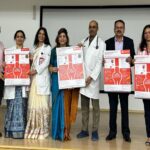- In urban India, more than 23% of women are either overweight or obese, which is higher than the prevalence among men (20%)
- 15-20% of children in India are overweight whereas 30% have an increased risk of falling in the category of obesity
- Program aimed at awareness building on causes, prevention, nutritional need and exercise.
Noida, January 17, 2019: Aimed at raising awareness on the critical threat posed by Obesity, Jaypee Hospital, a multi super-specialty hospital in Sector 128, Noida organized an event to educate public at large about its cause, prevention, nutritional need and exercises. While, experts and doctors suggest that prevention is better than cure, they also say that awareness is the first step towards prevention.
Obesity is increasing at an alarming rate throughout the world and has become a global problem. The World Health Organisation has declared overweight as one of the top 10 health risk in the world. The condition is more prevalent amongst women especially in urban areas. More than 23% of women are either overweight or obese, which is higher than the prevalence among men (20%). Reduced physical activity and changes in lifestyle and jobs that demand many hours of immobility are among the causes of obesity.
Obesity is increasing at an alarming rate throughout the world and has become a global problem. The World Health Organisation (WHO) has declared overweight as one of the top 10 health risks in the world. Obesity has serious long-term consequences. Obesity is not an immediately lethal disease itself, but has a significant risk factor associated with a range of serious non-
communicable diseases and conditions
Explaining about Obesity, Dr. Rajesh Kapoor Director, Department of GI and Hepatopancreatobiliary Surgery, Jaypee Hospital said, “Obesity in India has reached epidemic proportions in the 21st century, with morbid obesity affecting 5% of the country’s population. India’s obesity problem is surpassed only by that of China and the US. India is also the world capital of diabetes. With increasing population in obesity, we are going to have a tremendous load of patients suffering from diabetes which will have a huge burden in the healthcare industry. The reasons for obesity differ among different communities and their habitats. The most common reasons behind obesity among people are unhealthy eating habits, sedentary lifestyle, lack of sleep, stress etc. The general hostility towards physical activity coupled with apathy and lethargy is among the reasons for the growing number of obese people in India.”
“Obesity leads to production of certain hormones and excess fat releases proinflammatory substances which in turn can produce number of diseases e. g Diabetes mellitus ,hypertension, dyslipidemia, obstructive sleep apnoea, primary sterility etc. It also increases the risk of cardiovascular diseases (heart attack, stroke) and many cancers (breast, ovary, uterus, pancreas) and diseases of kidney. Hence it is advisable that public should be educated about obesity and its ill effects. All efforts should be made to control weight, but patients who fail to achieve adequate weight loss under medical supervision should be educated about surgical treatment of this metabolic disease. It is advisable that surgical option should be considered early before too many co morbidities have afflicted the patient,” added Dr. Kapoor.
Further explain about the surgical procedures, Dr. Kapoor said, “The surgical procedures are generally of two types: Restrictive – here the stomach size is reduced hence the intake .Restrictive and Malabsorbtive-here in addition to restricting the size of the stomach we also bypass the remaining part of stomach and proximal small intestine so that there is malabsorbstion of food which not only contributes to weight loss but also alters the hormonal milieu and this helps in long-term maintenance of low weight and also in resolution of comorbidities. Active lifestyle, healthy eating habits and regular exercise like yoga, aerobics, and swimming help a lot in reducing fat in the initial stages.”
Informing about the importance of healthy eating, Ms. Shruti Sharma Bariatric Counsellor and Nutritionist, Jaypee Hospital said, “Obesity is a major issue in India. With the growing availability of processed foods, India has seen a surge in obesity and obesity-related chronic diseases like heart disease and diabetes. A low-calorie, high-nutrition diet that helps lose weight without compromising the person’s health is highly recommended. A healthy Indian diet should include grains, lentils, vegetables, fruits, healthy fats, dairy and spices. When choosing a snack, pick a nutritious option that is low in sugar and high in nutrients. Water should be the main beverage and drinks with high sugar content, such as soft drinks and fruit juices, should be limited or avoided.”
The programme was concluded with an interactive session of the doctors with the people who were present in the event. The awareness session on weight loss management highlighted talks on management of obesity, physiotherapy, tips on healthy eating, body composition analysis including cooking session and recipe sharing.







